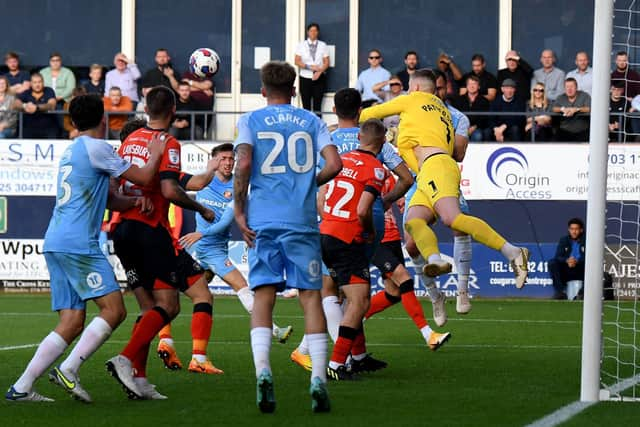Inside a Sunderland afternoon that was both encouraging and frustrating for Tony Mowbray and his team
and live on Freeview channel 276
Embleton pumped his fists but only after he had already turned on his heels and headed back for his own half. All of his team-mates were the same apart from Ellis Simms and Amad, who had gone to quickly retrieve the ball.
They wanted to win; expected to win.
Tony Mowbray afterwards admitted that the main emotion in the dressing room afterwards was one of frustration. Part of that is of course because of the bruising experience of back-to-back defeats, even if there had been positives within those games. But it also gave you a telling insight into the ambition of the group, who are competing week in, week out with teams established at this level. Mainly because of injuries, it feels as if there is a very good team here which remains just out of reach.
Advertisement
Hide AdAdvertisement
Hide AdWhich is why for Mowbray himself there was a balance to strike afterwards.
“We’re Sunderland, and we should always be disappointed when we don't win,” he said. He understood his players’ emotions because he felt the same.
What he also understood was that by just about any logic, this was a good point.
Mowbray has been coming to this ground as Blackburn Rovers boss for a number of years and so understands how difficult it is, their form on this turf the bedrock of their impressive rise to genuine play-off contenders. Sunderland supporters have a sense of it, too, from that first away game in the League One era when another 1-1 draw made you realise that all of this wasn’t going to be straightforward.


Advertisement
Hide AdAdvertisement
Hide AdEven with the very welcome sight of Ellis Simms back on the bench the injury list is daunting and particularly on a day like this, when Sunderland’s subsequent weaknesses are at risk of being exploited by the opposition’s key strengths.
Mowbray’s selection was a sign of his respect for what Nathan Jones has built. For the first time this season Bailey Wright was brought into the starting XI, with Luke O’Nien moved out to right back. Luton are not a long-ball team but their game is based on building the opportunity to play diagonals into their very impressive front two. Mowbray’s hope was that a more physical defence would help repel that, and that from there a forward line with running power and the ability to carry the ball long distances would get his side up the pitch.
To begin with, it didn’t work. Sunderland made too many errors in possession, inviting pressure and danger. Aside from one dizzying, mazy Jack Clarke drive into the box it was the hosts in the ascendancy.
After a while that began to change, and the frustration of Carlton Morris’ strike seconds before the interval was that it had come against the run of play, Mowbray’s side giving up the platform that they had worked so hard to build.
Advertisement
Hide AdAdvertisement
Hide AdAfter a slightly sluggish start Amad and Leon Dajaku were causing genuine problems and Horvath was the busier of the two goalkeepers. By and large Anthony Patterson’s work was limited to claiming or clearing set plays, which he did relentlessly with a lack of fuss that was in itself notable: there are players in this squad making rapid strides and he may well top the list.
In that Norwich goal there was naivety and frustration, an attempt at a quick free kick coughing up possession before Danny Batth felt he was fouled by Morris, allowing the striker the space he needed to score.
Mowbray again managed to just about bite his tongue on the officiating, and was reluctant to criticise the decision not to play for half time from his own side. He is trying to develop players and good habits, he explained, and sometimes these things can happen along the way. He liked the intent, in short, if not the execution.
That intent was key in eventually turning the game back Sunderland’s way.
Advertisement
Hide AdAdvertisement
Hide AdWith Patrick Roberts out wide and the tenacious, impressive Amad in central midfield, we had another one of these passages of play where you get a glimpse of something genuinely exciting: Quick passing play and a willingness to commit large numbers into the final third.
And a striker, doing striker things! There were eight minutes between Ellis Simms’ return and Sunderland getting on the scoresheet, and it would have been even sooner but for an outrageous block to deny Clarke from close range. Simms is not the finished article but he is a very promising player with the ability to compete with back to goal and to spin in behind. It doesn’t make all the difference, but it does without doubt make a hell of a difference all of the same.
Mowbray can be a little reluctant to talk about ‘the journey’ he is taking Sunderland on, because he knows it can sometimes jar with the stature and the history of the club. He wants to deliver the wins now, and so do his players.
He also knows that on the other side of the World Cup break he will have a significantly improved chance of doing that regularly, and while a pressure will come with that it’s one he will be a lot more comfortable shouldering.
For now it’s about, in his own words, ‘finding a way’. Here they did that, just about. A good point, for now.
